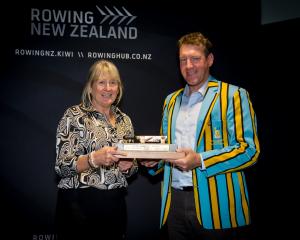
The Otago University's new head coach of the national high-performance centre in Dunedin was taught to scull at the age of 8.
"Dad is a rowing legend," Craies told the Otago Daily Times yesterday.
"He coached the New Zealand eight from 1950 to 1964."
Eric Craies was coach of the New Zealand eight that won silver medals at the 1950 Empire Games at Lake Karapiro and the 1962 Games in Perth.
His crew also went to the Tokyo Olympics in 1964.
Grant Craies' mother, Hilary (nee Vaudrey), rowed for New Zealand in the 1960s and was a member of the first New Zealand women's crew to compete overseas.
His wife, Rebecca (nee Caroe), competed for England in the Home Countries competition.
Craies (40) is adding to the family rowing tradition.
He competed for the New Zealand Under-23 team in the transtasman series in the lightweight coxless four in 1991.
He was a member of Auckland's West End Club's lightweight four and eight that won New Zealand championship gold medals in 1993.
Craies developed his coaching skills in England from 1994 with the Marlow Rowing Club and was head coach at the Tideway Scullers School from 1999 to 2005.
The highlight was his role as assistant coach at the Cambridge University Boat Club for three years from 2005.
"It was an intense time preparing crews for the annual boat race against Oxford," Craies said.
"But it was a fantastic experience."
Cambridge won one race and lost the other two in the three years Craies was involved with the crews.
Fellow New Zealander Duncan Holland was head coach of Cambridge at that time.
Craies is bringing this English experience to the role of head coach of the Otago University Rowing Club, which has 70 rowers on its books.
The plan is to have two high-performance squads with 20 rowers in each, and to prepare them for the Regional Performance Centre trials in September.
Craies' position has been created through funding from Sparc and Rowing New Zealand that matches money put into the University of Otago High Performance Rowing Centre by benefactors David Richwhite, former club president Marcel Gray, and the Callis Trust.
"My job is to run the Rowing New Zealand winter training programme at Otago University," he said.
One of his goals is to "catch students who rowed at school but disappeared from the system when they went to university."
He also wants to pick up new talent and encourage novices into the sport.
"At Cambridge we produced world and Olympic champions while they studied for their degrees," Craies said.
"I want to prove to students that they can reach high levels of sport while completing academic degrees."
He is working closely with chief executive Kereyn Smith at the New Zealand Academy of Sport South Island and tapping into the academy's expertise in sports nutrition.
Former New Zealand sprint champion Chris Donaldson is taking the rowers for strength training.











